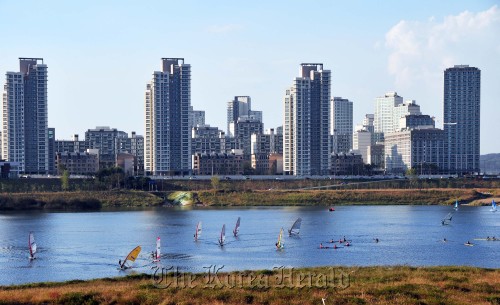Restorations to be put forward as model for wetland protection
Policymakers, experts and scholars from across the globe are set to discuss challenges and strategies for water resources and green growth at a forum hosted by the Korean government.
Kicking off Friday in Seoul, the two-day event is designed to review and underline the significance of the government’s landmark project to rev up water security, flood control and ecosystem dynamics in the country’s four major river basins, the Ministry of Land, Transport and Maritime Affairs said.
More than 70 public officials, academics and industry specialists from some 20 nations and multinational organizations will take part in roundtable discussions on issues such as water policy, sustainable growth, cultural tourism, water environment management and river ecosystems.
Attendees include Young Soo-gil, chairman of the Presidential Committee on Green Growth; Park Eun-kyung, president of the Korea Water Forum; Anthony Cox, head of the OECD’s environment and economy integration unit; Lee Kang-kun, a Seoul National University professor; Kenzo Hiroki, a research coordinator at Japan’s International Center for Water Hazard and Risk Management; and Boo Yoon-gyung, an executive director of Samsung C&T Corp.
“The conference will serve as a venue where we can assess the importance and achievements of the river project,” said Shim Myung-pil, head of the Office of National River Restoration under the Land Ministry.
“I hope we can receive positive reviews from experts at home and abroad there.”
During Friday’s sessions, panelists will examine the overall river project and seek a Korean model for water-related businesses, the ministry said. The agenda includes water resources, green growth, environment management, water policy and industry, cultural tourism and regional development, and international river ecosystem.
 |
Yachts sail on the Sejong Reservoir in the Geum River basin on Sept. 25 in Yeongi County, South Chungcheong Province. (Yonhap News) |
On Saturday, participants will visit the Han River, one of the four rivers flowing through Seoul, to see how its streams and wetlands have been transformed.
“I hope the events will not remain a one-time occasion but a periodic global forum through which we can secure academic support and export opportunities for the water industry,” Shim added.
Launched in July 2009, the river restoration program plays a pivotal role in President Lee Myung-bak’s “green growth” policy, which targets sustainable development while energizing local economy and creating jobs.
The Lee administration allocated more than 22 trillion won ($18.5 billion) for the five-year mega project to face-lift more than 900 kilometers of tributary streams and adjoining wetlands and install natural disaster prevention facilities.
“It is great that the government has been building four times as many anti-disaster facilities as the current ones under the program in preparation for a rainstorm that might come once in 200 years,” Lee said in August.
“Because of this project, many waterside areas can fend off recurrent flood damage.”
According to government data, Korea spends 4.2 trillion won on recovery measures for flood damage.
Ministry officials said the project will stimulate the construction industry with some 190,000 new jobs. The sector makes up nearly 20 percent of the nation’s gross domestic product.
It will also reserve 1.25 billion tons of water by building small and medium-sized dams and scaling up reservoirs for agricultural use, they added, while enhancing water quality by blocking and purifying dirty water near rivers.
To boost clean energy supplies, the government is setting up solar and hydropower generators along the four rivers, which are expected to cut 100,000 tons of greenhouse gas emissions each year, officials noted.
Last month, the Land Ministry unveiled some of fresh waterways and reservoirs as it is putting the finishing touches on the main courses of the four rivers ― Han River, Geum River, Nakdong River and Yeongsan River.
It plans to gradually open the 16 renovated reservoirs to the public by November, starting with Sejong and Baekje Reservoirs in the Geum River basin, South Chungcheong Province.
“Residents are now able to access the rivers and facilities around there for walking, biking, exercises, camping and other leisure activities,” the ministry said.
The project, however, has rekindled a heated debate over its efficacy in protecting the environment.
Civic groups and environmental activists claimed that a massive dredging of the riverbed aimed at digging waterways deeper causes some places to be even more vulnerable to flooding. Some scholars raised voice that the project is threatening local wildlife and the livelihoods of fishermen, as well as taking away nests from migratory birds and heaping pressure on the government budget.
The National Institute of Environmental Research said in a report that water quality of some areas along the Nakdong River is worse now than before the project, based on 2006 data.
By Shin Hyon-hee (
heeshin@heraldcorp.com)








